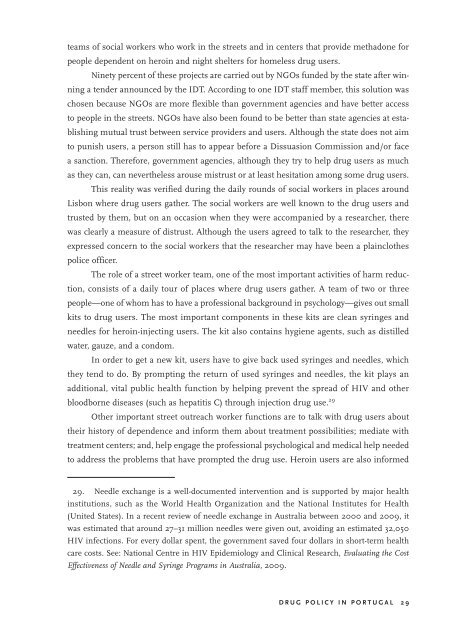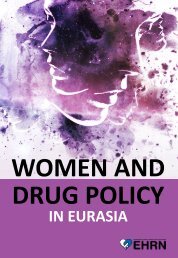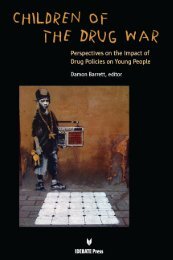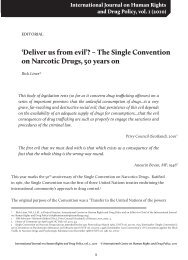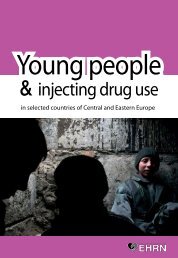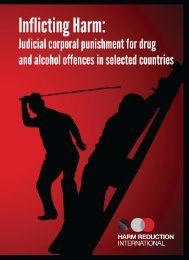From the Mountaintops-2011-Portugal-proof3.indd - Global Initiative ...
From the Mountaintops-2011-Portugal-proof3.indd - Global Initiative ...
From the Mountaintops-2011-Portugal-proof3.indd - Global Initiative ...
Create successful ePaper yourself
Turn your PDF publications into a flip-book with our unique Google optimized e-Paper software.
teams of social workers who work in <strong>the</strong> streets and in centers that provide methadone forpeople dependent on heroin and night shelters for homeless drug users.Ninety percent of <strong>the</strong>se projects are carried out by NGOs funded by <strong>the</strong> state after winninga tender announced by <strong>the</strong> IDT. According to one IDT staff member, this solution waschosen because NGOs are more flexible than government agencies and have better accessto people in <strong>the</strong> streets. NGOs have also been found to be better than state agencies at establishingmutual trust between service providers and users. Although <strong>the</strong> state does not aimto punish users, a person still has to appear before a Dissuasion Commission and/or facea sanction. Therefore, government agencies, although <strong>the</strong>y try to help drug users as muchas <strong>the</strong>y can, can never<strong>the</strong>less arouse mistrust or at least hesitation among some drug users.This reality was verified during <strong>the</strong> daily rounds of social workers in places aroundLisbon where drug users ga<strong>the</strong>r. The social workers are well known to <strong>the</strong> drug users andtrusted by <strong>the</strong>m, but on an occasion when <strong>the</strong>y were accompanied by a researcher, <strong>the</strong>rewas clearly a measure of distrust. Although <strong>the</strong> users agreed to talk to <strong>the</strong> researcher, <strong>the</strong>yexpressed concern to <strong>the</strong> social workers that <strong>the</strong> researcher may have been a plainclo<strong>the</strong>spolice officer.The role of a street worker team, one of <strong>the</strong> most important activities of harm reduction,consists of a daily tour of places where drug users ga<strong>the</strong>r. A team of two or threepeople—one of whom has to have a professional background in psychology—gives out smallkits to drug users. The most important components in <strong>the</strong>se kits are clean syringes andneedles for heroin-injecting users. The kit also contains hygiene agents, such as distilledwater, gauze, and a condom.In order to get a new kit, users have to give back used syringes and needles, which<strong>the</strong>y tend to do. By prompting <strong>the</strong> return of used syringes and needles, <strong>the</strong> kit plays anadditional, vital public health function by helping prevent <strong>the</strong> spread of HIV and o<strong>the</strong>rbloodborne diseases (such as hepatitis C) through injection drug use. 29O<strong>the</strong>r important street outreach worker functions are to talk with drug users about<strong>the</strong>ir history of dependence and inform <strong>the</strong>m about treatment possibilities; mediate withtreatment centers; and, help engage <strong>the</strong> professional psychological and medical help neededto address <strong>the</strong> problems that have prompted <strong>the</strong> drug use. Heroin users are also informed29. Needle exchange is a well-documented intervention and is supported by major healthinstitutions, such as <strong>the</strong> World Health Organization and <strong>the</strong> National Institutes for Health(United States). In a recent review of needle exchange in Australia between 2000 and 2009, itwas estimated that around 27–31 million needles were given out, avoiding an estimated 32,050HIV infections. For every dollar spent, <strong>the</strong> government saved four dollars in short-term healthcare costs. See: National Centre in HIV Epidemiology and Clinical Research, Evaluating <strong>the</strong> CostEffectiveness of Needle and Syringe Programs in Australia, 2009.DRUG POLICY IN PORTUGAL 29


